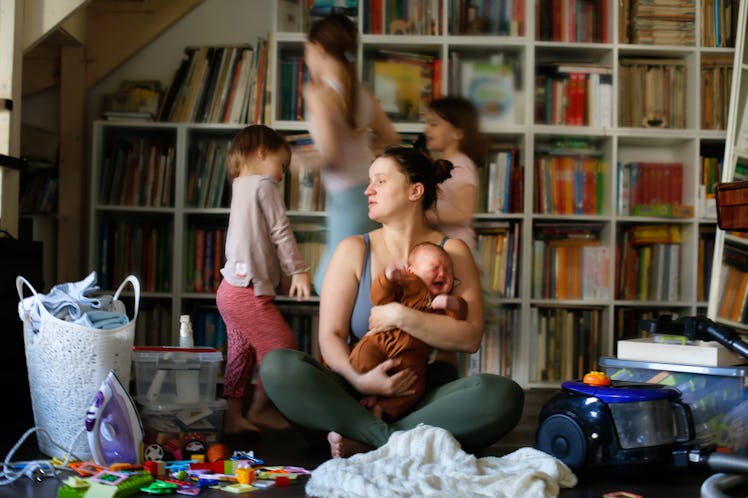The Research-Backed Reason Not To Fight When You're Sleep Deprived
Being tired is tough. Fighting when you’re tired is adding fuel to the fire.

If there’s one thing all new parents are intimately familiar with, it’s the middle of the night. Between the regular wake-up calls for feeding, diaper changes, sleep regressions, and illnesses, sleep is a rare but coveted experience. But even as they move away from the infant days, parents can expect sleep deprivation to stick around. A 2019 study, for example, found that on average parents can expect to have six years of bad sleep after welcoming a child. That kind of long-term and consistent sleep deprivation can do a number on our bodies — making us anxious, depressed, and just plain grumpy, not to mention increasing the risk of several chronic health conditions.
Thankfully, kids do eventually sleep through the night, and so do parents. But when you’re in the thick of it, surviving on just a few hours of broken sleep every night, it can mess with your head, not just your body. To that point, researchers from Montana State University and East Anglia University in the U.K. recently published a study quantifying just what sleep deprivation does to our mental states — and it’s not good. In fact, it puts us in a downright bad mood, and it’s a good reminder that if you’re running on no sleep, you may want to wait until you’re well-rested to decide if you’re truly unhappy or if you’re just dang tired. And you should probably hold off on bringing up that thing you’ve been meaning to discuss with your partner.
Your emotions go haywire on no sleep
The research team, led by Cara Palmer, Ph.D., analyzed data collected in 154 studies performed over 50 years that included 5,715 participants who had been deprived of sleep. Some studies required subjects to stay awake for long periods, while others woke participants periodically through the night or just made sure they didn’t get as much sleep as usual. Each study examined at least one mood- or emotion-related factor, with participants rating their mood, anxiety or depression levels, or responsiveness to emotional triggers.
Unsurprisingly to anyone who has ever been bone-tired and mad at their spouse, the researchers found that all the types of sleep loss resulted in a negative emotional response — respondents reported less joy, happiness, and contentment, and more anxiety symptoms.
“This occurred even after short periods of sleep loss, like staying up an hour or two later than usual or after losing just a few hours of sleep,” Palmer said in a statement. The researchers found that other emotions — sadness, worry, and stress — were less prevalent and consistent in the research.
The researchers found that sleep loss had the largest impact on personal affect, which is your overall mood — and that any form of sleep loss, from deprivation to restriction, killed people’s moods. In short, any degree of sleep loss has the potential to make you feel more anxious and depressed and to make you more vulnerable to “emotional stimuli” (such as your spouse leaving the toilet seat up or forgetting to take out the garbage).
How to ensure you (and your relationship) survive sleep deprivation
There are plenty of tips and tricks to make the physical pain of sleep loss less awful: exercise, coffee, hydration, and naps, of course, can help you get through the day on no sleep. But the cumulative effect of sleep deprivation — such as the kind that new parents experience — wreaks havoc on our emotional states and our ability to self-regulate.
Tired people, parents included, can (and should!) take a deep breath before they raise anything that might have ticked them off in the thick of sleep deprivation. Parenting psychologist Yael Schonbrun previously told Fatherly that when it comes to parenting disagreements, “our emotions are driving the bus.” Add that to an all-nighter spent caring for a sick, teething, or wakeful kid, and it’s no surprise we fly off the handle over what, in retrospect, feels like nothing.
While fights may not be entirely avoidable and are notoriously hard to schedule for later, when everyone’s feeling refreshed and ready to go, observing a few ground rules, even in the throes of exhaustion, can make things much easier:
- Focus on the problem at hand when you do argue.
- Try the LARA method: Listen, Affirm, Respond, Add Information.
- Remember that you can table big discussions if they’re not urgent, even if you’re in the middle of having the discussion, so long as you bring them back up later — especially if you’re already in a bad mood and know you aren’t going to behave as your most rational self.
And remember — if you’re tired, odds are your partner is too. Parenting is hard work: Cut each other some slack.
This article was originally published on